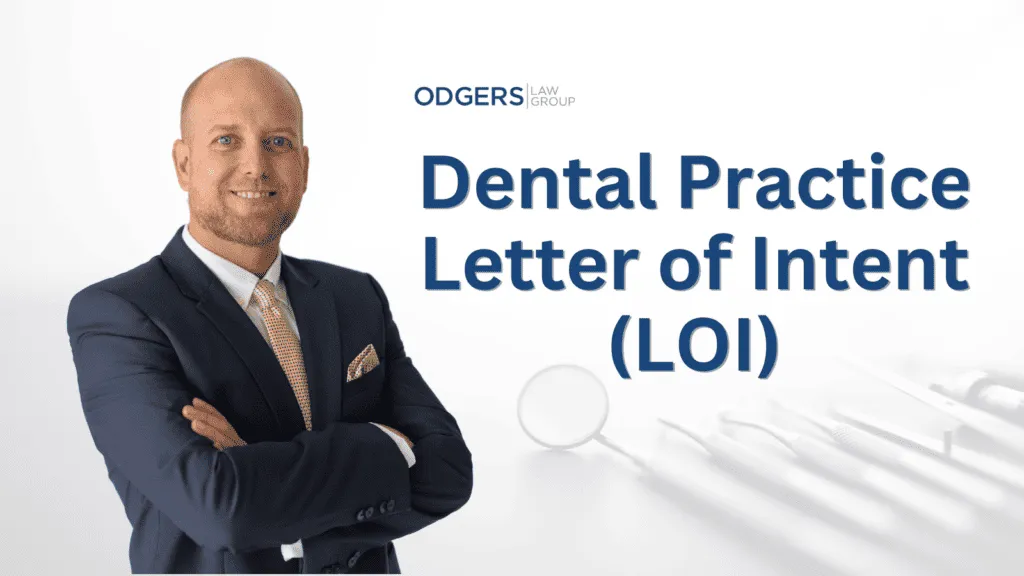
The Dental Practice Letter Of Intent (LOI)- 12 Essential Terms For A Successful Practice Transition
If you’re a dentist considering the purchase or sale of a dental practice, one of the first critical steps is drafting a dental practice Letter of Intent (LOI).

But what is a Letter of Intent, and why is it so crucial?
Let’s dive deeper into the dental office Letter of Intent terms, discuss the differences between a binding
and a nonbinding Letter of Intent, and explore when to submit a Letter of Intent.
What Is A Letter Of Intent?
A Letter of Intent serves as the preliminary agreement between a buyer and a seller that outlines the basic
terms and conditions of the transaction.
In the context of purchasing a dental practice, a dental practice purchase Letter of Intent outlines the potential
buyer’s intent to purchase the practice and sets the stage for the purchase agreement.
12 Essential Terms To Include In A Dental Practice Letter Of Intent
For dentists seeking to buy or sell a practice, crafting a well-defined Letter of Intent (LOI)
paves the way for a smoother transaction.
Here are twelve key terms to include in a Dental Practice Purchase LOI:
1. Identification of Parties: Clearly state the names of the buyer and the seller, along with their respective entities (if applicable), and the address of the dental office for sale. If the buyer has yet to establish an entity, use language like “Buyer’s Name, or an assignee entity to be formed by Buyer prior to Closing.”
2. Assets Included: Define what assets are included in the practice purchase, along with any assets that the seller specifically excludes. A general phrase such as “all tangible and intangible assets used in the income generation of the practice” is often sufficient.
3. Definitive Purchase and Sale Agreement: Include a provision indicating that there will be further negotiations and documentation before the closing. This statement reflects the understanding that a detailed purchase agreement still needs to be prepared and approved. Here is some sample language ”The transaction contemplated under this LOI will require further documentation and approvals, including the preparation and approval of a formal purchase agreement setting forth the terms and conditions of the proposed purchase in more detail, but Buyer and Seller execute this letter to evidence their intent to proceed in mutual good faith to carry out the Transaction substantially in the manner outlined herein.”
4. Purchase Price: Define the purchase price clearly. If there are agreed-upon terms for seller financing, ensure they are explicitly stated.
5. Deposit and Escrow: If a deposit is required, clearly state the deposit amount, along with the terms for its return or forfeiture. If using an escrow, include the contact information of theescrow company, stating who will bear the escrow fees.
6. Closing Date: Specify the anticipated closing date to guide the parties and their advisors towards a timely closing.
7. Contingencies: Contingencies are conditions that must be met before finalizing the sale. Common contingencies include (but are not limited to) the 1) buyer’s right to conduct due diligence, 2) Buyer’s right to securing lending on favorable terms, 3) buyers right to obtain a lease assignment, new lease, or purchase the real estate associated with the practice, and 4) ensuring the practice operates normally prior to closing.
8. Covenants: Include a clause stating that the Seller will agree to a non-compete and non-solicit agreement, preventing them from luring away patients and employees post-sale. In addition, if already agreed upon, state the duration of the covenants and the applicable radius from the practice.
9. Governing Law: State the jurisdiction that will govern the LOI in case of a dispute, This is usually the state where the Seller’s practice is located.
10. Costs: Include a statement that each party is responsible for their respective costs associated with the transaction. If there is a broker involved in the transaction, you may want to include who the broker is representing and who is responsible for paying their commission.
11. Exclusivity: Clarify whether the seller can market the practice to other potential buyers after signing the LOI.
12. Seller’s Post-Close Obligations: If the seller is expected to provide services post-close (like working in the practice or aiding in the transition), specify this arrangement and the associated compensation.
Including these key terms in your Dental Practice Purchase LOI will ensure clarity and
mutual understanding between the buyer and seller, paving the way for a smoother
transaction process.
**This list is not all inclusive and is for education purposes. Each practice transaction is unique and each
letter of intent should be drafted by a qualified attorney who is aware of the specific facts of the deal.
Always remember to consult with an experienced dental attorney when drafting or reviewing an LOI
to ensure all potential issues are properly addressed.
12 Essential Terms To Include In A Dental Practice Letter Of Intent
For dentists seeking to buy or sell a practice, crafting a well-defined Letter of Intent (LOI)
paves the way for a smoother transaction.
Here are twelve key terms to include in a Dental Practice Purchase LOI:
1. Identification of Parties: Clearly state the names of the buyer and the seller, along with their respective entities (if applicable), and the address of the dental office for sale. If the buyer has yet to establish an entity, use language like “Buyer’s Name, or an assignee entity to be formed by Buyer prior to Closing.”
2. Assets Included: Define what assets are included in the practice purchase, along with any assets that the seller specifically excludes. A general phrase such as “all tangible and intangible assets used in the income generation of the practice” is often sufficient.
3. Definitive Purchase and Sale Agreement: Include a provision indicating that there will be further negotiations and documentation before the closing. This statement reflects the understanding that a detailed purchase agreement still needs to be prepared and approved. Here is some sample language ”The transaction contemplated under this LOI will require further documentation and approvals, including the preparation and approval of a formal purchase agreement setting forth the terms and conditions of the proposed purchase in more detail, but Buyer and Seller execute this letter to evidence their intent to proceed in mutual good faith to carry out the Transaction substantially in the manner outlined herein.”
4. Purchase Price: Define the purchase price clearly. If there are agreed-upon terms for seller financing, ensure they are explicitly stated.
5. Deposit and Escrow: If a deposit is required, clearly state the deposit amount, along with the terms for its return or forfeiture. If using an escrow, include the contact information of theescrow company, stating who will bear the escrow fees.
6. Closing Date: Specify the anticipated closing date to guide the parties and their advisors towards a timely closing.
7. Contingencies: Contingencies are conditions that must be met before finalizing the sale. Common contingencies include (but are not limited to) the 1) buyer’s right to conduct due diligence, 2) Buyer’s right to securing lending on favorable terms, 3) buyers right to obtain a lease assignment, new lease, or purchase the real estate associated with the practice, and 4) ensuring the practice operates normally prior to closing.
8. Covenants: Include a clause stating that the Seller will agree to a non-compete and non-solicit agreement, preventing them from luring away patients and employees post-sale. In addition, if already agreed upon, state the duration of the covenants and the applicable radius from the practice.
9. Governing Law: State the jurisdiction that will govern the LOI in case of a dispute, This is usually the state where the Seller’s practice is located.
10. Costs: Include a statement that each party is responsible for their respective costs associated with the transaction. If there is a broker involved in the transaction, you may want to include who the broker is representing and who is responsible for paying their commission.
11. Exclusivity: Clarify whether the seller can market the practice to other potential buyers after signing the LOI.
12. Seller’s Post-Close Obligations: If the seller is expected to provide services post-close (like working in the practice or aiding in the transition), specify this arrangement and the associated compensation.
Including these key terms in your Dental Practice Purchase LOI will ensure clarity and
mutual understanding between the buyer and seller, paving the way for a smoother
transaction process.
**This list is not all inclusive and is for education purposes. Each practice transaction is unique and each
letter of intent should be drafted by a qualified attorney who is aware of the specific facts of the deal.
Always remember to consult with an experienced dental attorney when drafting or reviewing an LOI
to ensure all potential issues are properly addressed.
Binding Vs. Nonbinding Terms In A Dental Practice Letter Of Intent
An important distinction to understand when drafting a Letter of Intent is the difference between a binding and a nonbinding Letter of Intent. A binding LOI legally obligates both parties to adhere to its terms, while a nonbinding LOI serves as a roadmap for negotiations, which can be adjusted as both parties see fit.
Typically, in a Dental Office Letter of Intent, certain provisions, like confidentiality and exclusivity, are binding, while other terms, like purchase price and closing date, remain nonbinding until the final purchase agreement is signed.


Binding Vs. Nonbinding Terms In A Dental Practice Letter Of Intent
An important distinction to understand when drafting a Letter of Intent is the difference between a binding and a nonbinding Letter of Intent. A binding LOI legally obligates both parties to adhere to its terms, while a nonbinding LOI serves as a roadmap for negotiations, which can be adjusted as both parties see fit.
Typically, in a Dental Office Letter of Intent, certain provisions, like confidentiality and exclusivity, are binding, while other terms, like purchase price and closing date, remain nonbinding until the final purchase agreement is signed.

Who Drafts The Letter Of Intent In A Dental Practice Transaction?
Typically, the buyer or the buyer’s attorney drafts the Letter of Intent (LOI) in a dental transaction. This allows the buyer to set the initial terms and conditions for the practice purchase based on their understanding of the dental office and their negotiations with the seller or the seller’s broker.
With that being said, there is no hard requirement that the buyer draft the LOI.
In fact, many times the Seller’s broker will give the buyer a pre-populated letter of intent with terms that the Seller is ready to accept. The buyer and the buyers attorney, then will review the draft, make any revisions, and sign and submit it to the Seller.
When To Submit A Dental Practice Letter Of Intent When Buying A Dental Office?
A Dental Practice Purchase Letter of Intent is usually submitted after initial discussions and once the potential buyer has reviewed the practice’s basic financial information.
The LOI represents a serious commitment on the part of the buyer, and thus, it’s important to be sure you’re ready to move forward with the transaction before you submit your LOI.


When To Submit A Dental Practice Letter Of Intent When Buying A Dental Office?
A Dental Practice Purchase Letter of Intent is usually submitted after initial discussions and once the potential buyer has reviewed the practice’s basic financial information.
The LOI represents a serious commitment on the part of the buyer, and thus, it’s important to be sure you’re ready to move forward with the transaction before you submit your LOI.

Summary Of Submitting A LOI For A Dental Office
In conclusion, a Letter of Intent is an essential step in the purchase of a dental practice. It lays the groundwork for negotiations and signals serious intent from the buyer.
Always consult with your legal and financial advisors when drafting a Letter of Intent to ensure that you fully understand the implications and commitments being made.
Navigating the complexities of a dental practice purchase doesn’t have to be stressful or confusing. With the right information and expert guidance, you can make informed decisions and successfully transition to your new practice.
Sample Letter Of Intent To Purchase Dental Practice
The Dental practice letter of intent sample provided herewith is strictly for educational purposes only. This document is not intended to serve as legal advice or a substitute for professional legal counsel. The use of this template does not constitute an attorney-client relationship between the user and our law firm.
While this Dental practice letter of intent template may serve as a starting point in understanding the basic components of a Letter of Intent (LOI), the unique and specific aspects of each dental practice purchase require tailored legal advice.
It is strongly recommended that any individual intending to use this letter of intent for a real transaction obtain advice from a qualified attorney. Only a legal professional can ensure that all necessary and specific details are included, all obligations and rights are clearly defined, and your interests are adequately protected.
By downloading and/or using this free dental practice letter of intent pdf, you acknowledge that it is for educational purposes only and agree to seek advice from a licensed attorney before drafting or submitting an LOI. Proceeding without proper legal guidance can lead to serious legal and financial consequences.
Please be aware that laws vary from state to state and jurisdiction to jurisdiction, so the provisions in this sample letter may not be appropriate or valid in all circumstances. Be sure to engage an attorney familiar with the laws and practices in your specific region or situation.
Sample Dental Practice Purchase Lol

Top California Law Firm For Dentists
